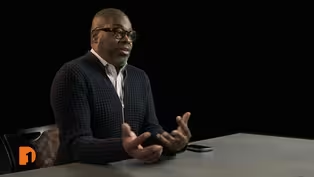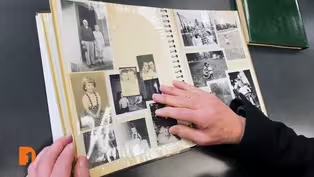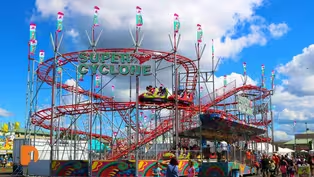
The Black Church’s role in the Great Migration to Detroit
Clip: Season 10 Episode 2 | 7m 14sVideo has Closed Captions
A look at how Black churches helped Southerners who came North during the Great Migration.
“Black Church in Detroit” series examines the church's role and impact during the Great Migration. One Detroit contributor Stephen Henderson talks with Pastor Lawrence Rodgers of Second Baptist Church of Detroit and Elliott Hall, the historian for Tabernacle Missionary Baptist Church, about how the Black church helped Southerners who migrated to Detroit.
Problems playing video? | Closed Captioning Feedback
Problems playing video? | Closed Captioning Feedback
One Detroit is a local public television program presented by Detroit PBS

The Black Church’s role in the Great Migration to Detroit
Clip: Season 10 Episode 2 | 7m 14sVideo has Closed Captions
“Black Church in Detroit” series examines the church's role and impact during the Great Migration. One Detroit contributor Stephen Henderson talks with Pastor Lawrence Rodgers of Second Baptist Church of Detroit and Elliott Hall, the historian for Tabernacle Missionary Baptist Church, about how the Black church helped Southerners who migrated to Detroit.
Problems playing video? | Closed Captioning Feedback
How to Watch One Detroit
One Detroit is available to stream on pbs.org and the free PBS App, available on iPhone, Apple TV, Android TV, Android smartphones, Amazon Fire TV, Amazon Fire Tablet, Roku, Samsung Smart TV, and Vizio.
Providing Support for PBS.org
Learn Moreabout PBS online sponsorship(bright piano music) - Pastor Rogers, let's start with the story of Second Baptist.
And I think, even as renowned as that story is, as familiar as it is to some folks in this community, I'm not sure everyone really understands how pivotal Second Baptist was in particular during this period of time that African Americans are moving in large numbers from the South to cities like Detroit.
So let's just start with that story.
- This is an important topic, because folks oftentimes know where they are, but they do not know how they got there.
As you are aware of, the Great Migration was a time when African Americans, and other groups as well, but we're looking at it from a particularly African-American perspective, wanted to leave the sharecropping fields, wanted to have a better life.
They were weary of the racial terrorism that they were experiencing in Southern states, and many of them moved to Northern states, industrial cities in hope of finding a new life, finding employment where they could take care of their family and possibly gain entry into the middle class.
And Second Baptist was a pivotal instrument for migrants during the time of the Great Migration.
You know, during that time, the congregation provided spiritual and material support to Southern African Americans moving to Detroit.
When the migrants would come, they literally would be housed in the church.
Programs to help them to go from a agrarian culture to actually working in the plant-like setting, many of which would go through this training.
For your viewers who've read Booker T Washington's "Up from Slavery," he writes about how he does something similar with people who would leave the fields to go to Tuskegee, and how he would have a program to help them to transition from the agrarian life and to the academic life.
Bradley had something similar here.
And he had a connection to Ford, to Henry Ford.
Him and Henry Ford were friends.
And so people would go through this program, literally sleep in the church on the pews, and he would write a letter of reference, and they would immediately get hired at the Ford company.
So Second Baptist became a very important hub for migrants.
And from that, the church grew to thousands of members, of folks who made this church their home, particularly around the support that they received from migrating to Detroit, and also the support that they received in gaining employment at the Ford Company.
- Yeah, yeah, no, it is an incredible story, and it is such an important part of our history here in Detroit.
Elliott Hall, I want to bring you into the conversation here.
One of the things that also happens when you've got this migration of thousands and thousands of people from the South to cities like Detroit, is people need to find a religious home.
And in some cases, they didn't necessarily turn to established churches.
They decided to build their own.
And Tabernacle, where you are a historian, is an example of that.
Tell us a little about that story.
The founding of Tabernacle during this period.
- In 1920 in Cordele, Georgia, 20 families decided that the share cropping life was not a feasible future for any of them.
They all decided as a group to move from Cordele, Georgia, to Detroit.
Now the logistics of that is fabulous because they laid out where they going, who was gonna stay where and where, who's gonna live here.
Some people had relatives, but they all came as a group.
And one of the founders of Tabernacle was Lindsey Sheffield, the great-grandfather of Mary Sheffield, who as you know, is running for mayor this year.
And she's president of the city council.
So I know Mary, I know her father, Horace, I know her grandfather Horace the first, and then of course, Lindsey Sheffield who became, when I was a youngster, the superintendent of the Tabernacles Sunday school.
But the idea, the driving idea that brought these families here was, most of 'em were sharecroppers getting paid maybe once or twice a year when the crops came in, the attraction of getting paid once a week on Friday was compelling.
They all came up and they were able to save money and they all got their own homes.
Now, the interesting thing is that the church was first founded on one row, just down the street from Second Baptist, but rather than join the established Second Baptist church, these 20 families decided to form their own church.
And they started in a storefront on Monroe, now where we now know as Greek Town.
And then after they got it underway they decided to bring the retired pastor of the Tabernacle Baptist Church from Cornell, Georgia.
Man was retired, but they convinced him to move to Detroit to take over the membership, not the membership, but the pastorship of the Tabernacle Baptist Church.
- Let's cast forward to now, and I guess connect that history to the mission that the church has now.
This idea of the foundational role, I guess, that it has in the African-American community.
I think that's one of the ways that, especially for young people, it becomes easier to understand why it's important to know what that history was.
- I think that what's at the heart of this for today's generation is an advocacy for us being, as the Bible will say, being kind to the stranger.
That word "stranger" in the original language could be translated as of immigrant or migrant, the one that's traveling.
But there's also, I think, advocacy to be available to those who are vulnerable, to those who are marginalized, to those who are seeking a better life for themselves.
Down South to Detroit: Stephen Henderson details his family’s history during The Great Migration
Video has Closed Captions
Clip: S10 Ep2 | 7m 49s | Stephen Henderson shares his family’s journey from the South to Detroit during the Great Migration. (7m 49s)
Video has Closed Captions
Clip: S10 Ep2 | 7m 18s | One Detroit contributor Nolan Finley shares his family’s history during the Great Migration. (7m 18s)
One Detroit Weekend | Things to do around Detroit this weekend: July 11, 2025
Clip: S10 Ep2 | 2m 20s | Summer festivals, events on the water, art fairs and more around metro Detroit this weekend. (2m 20s)
Providing Support for PBS.org
Learn Moreabout PBS online sponsorship
- News and Public Affairs

Top journalists deliver compelling original analysis of the hour's headlines.

- News and Public Affairs

FRONTLINE is investigative journalism that questions, explains and changes our world.












Support for PBS provided by:
One Detroit is a local public television program presented by Detroit PBS


